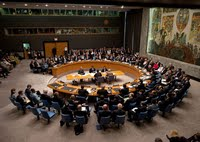Since the financial crisis broke in 2008, the United Nations Security Council has looked like a poor relation to the newly empowered Group of Twenty (G-20). While world leaders tackled the crisis at biannual G-20 summits, ambassadors in New York got on with the daily grind of reviewing peace operations and routinely condemning far-flung atrocities.
The council has occasionally been in the limelight, not least during this summer's tortuous negotiations over new sanctions on Iran. But a top-level meeting on the council's role convened by Turkey this September was an illustrative bore, producing a statement calling for a "continuous process of reflection and adaptation" to make the U.N. stronger.
"Continuous reflection" is good for monks and philosophy majors. But when it creeps into an international organization's vision statement, it's often a sign of stagnation.

